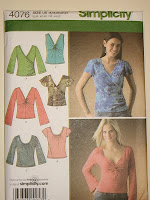 As you use your charting device, keep in mind that you can trace sewing patterns onto its mylar sheet. You can even layer sewing patterns between two mylar sheets and not bother tracing. Follow the stitching line, though, not the cutting line, or every piece will be 5/8" too big all the way around.
As you use your charting device, keep in mind that you can trace sewing patterns onto its mylar sheet. You can even layer sewing patterns between two mylar sheets and not bother tracing. Follow the stitching line, though, not the cutting line, or every piece will be 5/8" too big all the way around.Went on a foray to look at suitable patterns that I could simply trace onto the mylar sheet and found a bunch of cute ones at McCalls, Simplicity, Vogue and Kwik Sew. All these companies have nice websites where you can shop to your heart's content, search for what you want quickly, view the front of the pattern, view the back of the pattern, and order patterns. They run sales, too. I love to shop for them online, but I like to purchase them locally. There's a Vogue I want next, and the number is on a Post-It in my purse.
The essential thing to look for is that it's sized for knits. On the back, look in the paragraph about suitable fabrics.
This pattern has five sizes inside! And, you don't have to cut it up if you trace it onto your charting device.
Before I risk my precious cashmere blend yarn, I'll knit this with something less expensive, or I might sew one up with a stretchy t-shirt cotton. I like that version in the blue for starters. I want to play with that wrap front.



.tif)

Diana, This is so great!! I just unpacked my Knit Leader and set it up last night, for the first time. I'm going to make my son a sweater - my first full sized garment. I'm so excited. I've wondered ever since learning about the patterning device if you couldn't just use a sewing pattern designed for knits. I can't wait to try it out.
ReplyDeleteAny guidelines in determing the amount of yarn needed for a cut and sew project like this?
ReplyDeleteI am queen size and very hard to fit with custom knits. I fully understand how to alter sewing patterns to fit my shape and have decided that cut and sew using the knitleader is probably the best use of my knitting machine.
Kathryn, I actually don't do much cut and sew using the knitleader. I shape with increases and decreases, and once in a while I do cut and sew for the neck but shape all the rest.
ReplyDeleteAs to yarn requirements, it varies tremendously by the thickness and the density of the yarn. For instance, cotton weighs more for a certain number of yards than wool. Thinner yarn requires less overall weight for the same sweater than thicker yarn.
A lot of times you know how much your yarn weighs but don't have yardage. You can knit a sample and figure your yards per ounce.
A few rules of thumb - a women's medium long-sleeved sweater will almost always take less than a pound of yarn. I have never had a plus size women's sweater take more than a pound of yarn if it was short-sleeved; I've had it go over if it was long sleeved, had a big collar, or whatever.
A long sleeved sweater will take less than 4 times the yarn the back takes, so if you have to, you knit the back and weigh it to see if you have enough yarn).
The cardboard cones in yarn weigh less than an ounce.
I use a Weight Watcher food scale to weigh yarn.
I think I'll compose a blog post about yarn requirements.
Oh to have knitleader work on a Bond USM!!!! Any chance?
ReplyDeleteLoren
Sure, Loren! You could pick up a used KL116 and a set of bulky gauge strips. Then you'd have to move the trip lever twice for every row with your hand.
ReplyDeleteOHH!!!! OHHHHHHH I'm so excited!! Pattern to gauge instead of gauge to pattern!!!! Sounds so much easier.
ReplyDeleteThank you,
Loren